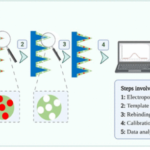2023-02-06 スウェーデン王国・カロリンスカ研究所(KI)
◆CAR T細胞療法は、比較的新しいタイプの免疫療法で、患者さんの血液から免疫細胞(T細胞)を取り出し、腫瘍細胞の表面にあるキメラ抗原受容体(CAR)という分子を特異的に攻撃する新しい遺伝子を実験室で注入します。患者さんに戻すと、T細胞はより攻撃的になり、誘導ミサイルのようにがん細胞を攻撃します。
◆「この治療法は、現在、血液がんの患者さんに使用されていますが、この方法を卵巣がんの治療に使用できるかどうかを調べたいと思います」と、この研究の共同最終著者であるカロリンスカ研究所腫瘍病理学部のイザベル・マガルヘス博士は述べています。「と、本研究の共同最終著者であるカロリンスカ研究所腫瘍病理学部のIsabelle Magalhaesは述べている。「利用可能な治療法に多くの改善が見られるものの、卵巣癌の女性の予後は依然として悪いのです。
◆卵巣腫瘍の多くにはメソセリンが含まれており、研究者らは、この特定のタンパク質を攻撃するようにプログラムされた3種類のCAR分子を試したいと考えた。そこで研究チームは、試験管の中で卵巣がん細胞をプログラムされたCAR T細胞に繰り返し接触させ、マウスを使った実験を何度も行った。
◆その結果、3種類のCAR T細胞はいずれも、がんを患ったマウスを対照群よりも有意に延命させ、中でもM1xx CAR T細胞と呼ばれるタイプの細胞が最も効果的であることが判明しました。この特定の分子を発現するT細胞を投与されたマウスは、腫瘍の大きさが縮小し、他のマウスよりもさらに長生きしたのです。何匹かのマウスは完治しました。
◆「何匹かのマウスでは、検出できる腫瘍細胞は残っておらず、その効果は治療開始後3カ月余り持続しました。これは、メソセリンタンパク質を攻撃するCAR T細胞を含む免疫療法が、卵巣がんに対して有望であることを示す証拠です」とMattsson教授は述べています。
◆”うまくいけば、この発見が臨床研究への道を開くことになるでしょう。”と彼は言います。”私たちの目標は、卵巣癌の女性の体内に浸潤して腫瘍を攻撃し、生存できるCAR T細胞を作り出すための最適な条件を予測することです。”
<関連情報>
- https://news.ki.se/new-immunotherapy-holds-promise-for-ovarian-cancer
- https://jitc.bmj.com/content/11/2/e005691
MSLN-CAR T細胞の活性化を調整することで、卵巣がんモデルにおいて優れた抗腫瘍効果が得られること Tuned activation of MSLN-CAR T cells induces superior antitumor responses in ovarian cancer models
Esther Schoutrop,Thomas Poiret,Ibrahim El-Serafi,Ying Zhao,Rui He,Alina Moter,Johan Henriksson,Moustapha Hassan,Isabelle Magalhaes and Jonas Mattsson
The Journal for ImmunoTherapy of Cancer online: 6 februari 2023
DOI:http://dx.doi.org/10.1136/jitc-2022-005691

Abstract
Background Limited persistence of functional CAR T cells in the immunosuppressive solid tumor microenvironment remains a major hurdle in the successful translation of CAR T cell therapy to treat solid tumors. Fine-tuning of CAR T cell activation by mutating CD3ζ chain immunoreceptor tyrosine-based activation motifs (ITAMs) in CD19-CAR T cells (containing the CD28 costimulatory domain) has proven to extend functional CAR T cell persistence in preclinical models of B cell malignancies.
Methods In this study, two conventional second-generation MSLN-CAR T cell constructs encoding for either a CD28 co-stimulatory (M28z) or 4-1BB costimulatory (MBBz) domain and a novel mesothelin (MSLN)-directed CAR T cell construct encoding for the CD28 costimulatory domain and CD3ζ chain containing a single ITAM (M1xx) were evaluated using in vitro and in vivo preclinical models of ovarian cancer. Two ovarian cancer cell lines and two orthotopic models of ovarian cancer in NSG mice were used: SKOV-3 cells inoculated through microsurgery in the ovary and to mimic a disseminated model of advanced ovarian cancer, OVCAR-4 cells injected intraperitoneally. MSLN-CAR T cell treatment efficacy was evaluated by survival analysis and the characterization and quantification of the different MSLN-CAR T cells were performed by flow cytometry, quantitative PCR and gene expression analysis.
Results M1xx CAR T cells elicited superior antitumor potency and persistence, as compared with the conventional second generation M28z and MBBz CAR T cells. Ex vivo M28z and MBBz CAR T cells displayed a more exhausted phenotype than M1xx CAR T cells as determined by co-expression of PD-1, LAG-3 and TIM-3. Furthermore, M1xx CAR T cells showed superior ex vivo IFNy, TNF and GzB production and were characterized by a self-renewal gene signature.
Conclusions Altogether, our study demonstrates the enhanced therapeutic potential of MSLN-CAR T cells expressing a mutated CD3ζ chain containing a single ITAM for the treatment of ovarian cancer. CAR T cells armored with calibrated activation potential may improve the clinical responses in solid tumors.


